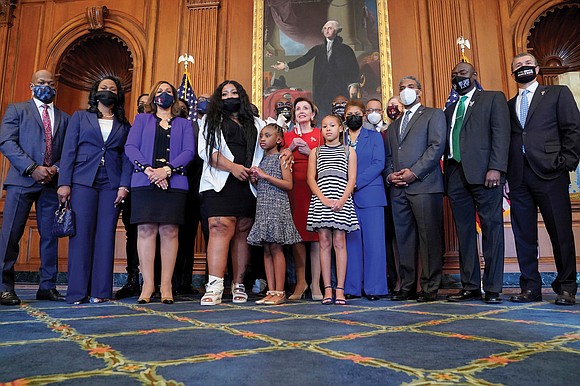Lawmakers, others hopeful about passage of federal George Floyd Justice in Policing Act
Free Press wire reports | 5/27/2021, 6 p.m.

A year after his killing unleashed a national reckoning over racial injustice, George Floyd’s relatives met on Tuesday with President Joe Biden and Vice President Kamala Harris at the White House and with lawmakers on Capitol Hill to urge passage of police reform legislation in their loved one’s name.
Mr. Floyd, a 46-year-old Black man who died in handcuffs with a white Minneapolis police officer kneeling on his neck for more than 9 minutes, became the face of a national movement challenging police brutality and bias in the U.S. criminal justice system.
His dying words, “I can’t breathe,” have echoed as a slogan in street demonstrations that convulsed the United States and the world last summer in the midst of the coronavirus pandemic.
But Tuesday’s private Oval Office visit marked the first time any of Mr. Floyd’s family had been hosted at the White House, occupied since January by a Democratic administration.
President Biden’s Republican predecessor, Donald Trump, was widely criticized for political rhetoric seen as inflaming racial tensions heightened in the aftermath of Mr. Floyd’s killing.
Lawmakers negotiating the federal police reform bill say they are optimistic about the prospects for a bipartisan deal, despite missing a deadline set by President Biden of the first anniversary of Mr. Floyd’s death.
Meanwhile, legislation has been pursued in all 50 states and the District of Columbia to increase the accountability or oversight of police, and 24 states have enacted new laws, according to the National Conference of State Legislatures.
Mr. Floyd’s relatives used their pilgrimage to Washington to lobby Congress for enactment of federal legislation ensuring the just treatment of minorities by law enforcement.
In March, the Democratic-led U.S. House of Representatives passed the George Floyd Justice in Policing Act, seeking to end contentious police tactics such as “chokeholds,” while making it easier to sue individual police officers for unlawful conduct.
A bipartisan group of lawmakers has been working to hammer out a compromise to win enough Republican support to ensure passage in the U.S. Senate, where Democrats hold a razor-thin margin of control.
“If you can make federal laws to protect the (national) bird, which is the bald eagle, you can make federal laws to protect people of color,” Mr. Floyd’s brother, Philonise, said outside the White House after he and five other family members met with the president and vice president.
He described President Biden as supportive and “a genuine guy.”
“He did let us know that he supports passing the bill, but he wants to make sure that it is the right bill and not a rushed bill,” said Mr. Floyd’s nephew, Brandon Williams.
Republicans and Democrats in Congress have in many ways become even more divided in the year since Mr. Floyd’s death. President Biden’s plans to spend trillions on public works, funded by taxes on the wealthy and companies, have been dismissed by Republi- cans, and his COVID-19 relief package did not win a single Republican vote.
Democrats suggested that won’t happen with police reform.
“We will get this bill on President Biden’s desk,” said Rep. Karen Bass of California, a Democrat leading House negotiations, at an event with Floyd family members in Washington. “We will work until we get the job done. It will be passed in a bipartisan manner.”
Republicans and police unions oppose provisions in the bill rolling back qualified immunity, a legal doctrine that shields individual police officers from lawsuits in certain circumstances.
Many Democrats say they would only support a bill that abolishes qualified immunity.
U.S. Sen. Tim Scott of South Carolina, a lead Republican negotiator, said despite that main point of contention, lawmakers are making progress.
“We have a long way to go still, but it’s starting to take form,” Sen. Scott told reporters.
Moments before departing the White House by helicopter a short time after the meeting for a flight back to his home state of Delaware, President Biden told reporters he had spoken to negotiators on the bill and was “hopeful that sometime after Memorial Day we’ll have an agreement.”
“We have to act,” President Biden said in a statement issued by the White House. “The battle for the soul of America has been a constant push and pull between the American ideal that we’re all created equal and the harsh reality that racism has long torn us apart.”





